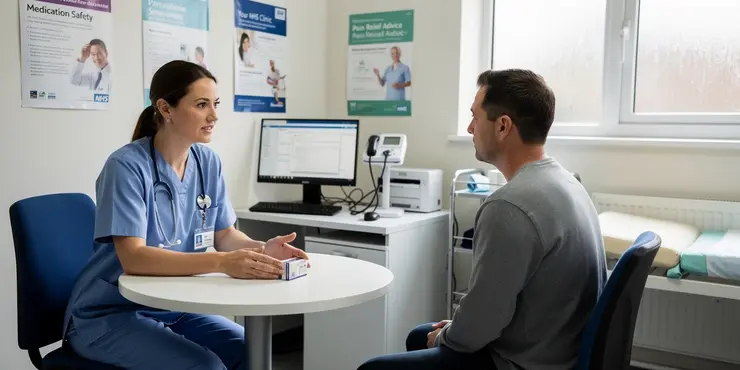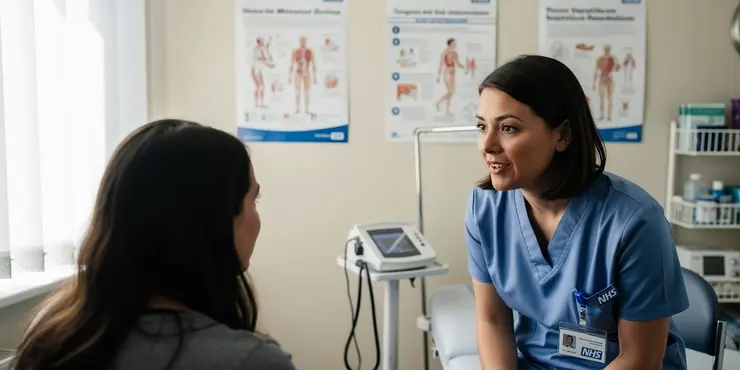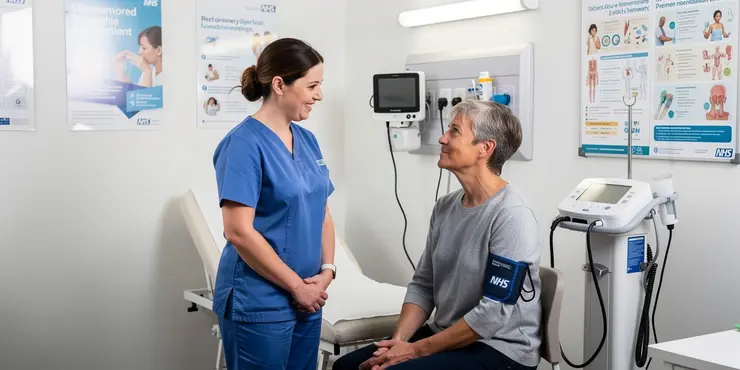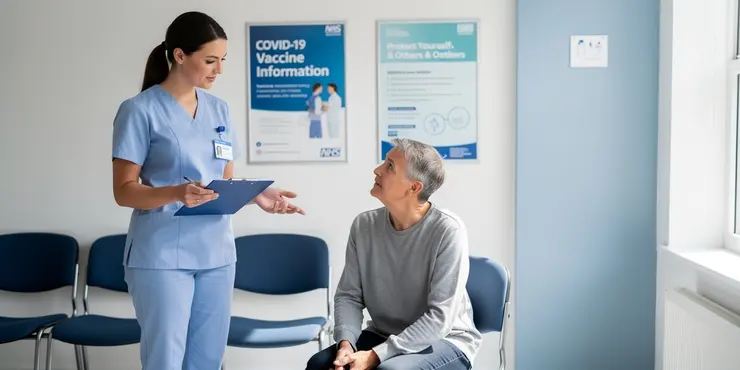
Find Help
More Items From Ergsy search
-

What are the side effects of Paracetamol?
Relevance: 100%
-

What is Paracetamol?
Relevance: 66%
-

What is Paracetamol?
Relevance: 66%
-

Is Paracetamol the same as Aspirin?
Relevance: 64%
-

What is a common use of paracetamol?
Relevance: 60%
-

Does Paracetamol reduce inflammation?
Relevance: 60%
-

Which one is better for headaches: Aspirin or Paracetamol?
Relevance: 59%
-

What is the difference between Aspirin, Paracetamol, and Ibuprofen?
Relevance: 57%
-

Which one is better for toothache: Ibuprofen or Paracetamol?
Relevance: 56%
-
What is the difference between aspirin, paracetamol, and ibuprofen?
Relevance: 56%
-

What are the common side effects of vaccines?
Relevance: 55%
-

Are there any side effects to the flu vaccine?
Relevance: 55%
-

Is it safe to take Paracetamol with Ibuprofen?
Relevance: 54%
-

Will I experience side effects from the COVID jab?
Relevance: 54%
-

Are there any side effects of the winter flu jab?
Relevance: 53%
-

What are the side effects of Botox?
Relevance: 52%
-

What are the side effects of Ozempic?
Relevance: 52%
-

Is paracetamol linked to autism?
Relevance: 52%
-

What are the side effects of Botox?
Relevance: 52%
-

What should I do if I experience side effects from a vaccine?
Relevance: 51%
-

Why might someone choose Paracetamol over NSAIDs?
Relevance: 51%
-

Is there any risk of using paracetamol outside of pregnancy with regard to autism?
Relevance: 51%
-

What are the side effects of Ibuprofen?
Relevance: 51%
-

What are the side effects of Aspirin?
Relevance: 51%
-

What are the common side effects after a facelift?
Relevance: 50%
-

Are there any common side effects of Mounjaro?
Relevance: 50%
-

What are the common side effects of Abiraterone?
Relevance: 50%
-

What are the common side effects of Ozempic?
Relevance: 50%
-

What are common side effects of Baxdrostat?
Relevance: 50%
-

What are common side effects of Wegovy?
Relevance: 50%
-

What are common side effects of CBD?
Relevance: 49%
-

What are common side effects of antibiotics?
Relevance: 49%
-

What should I do if I experience side effects after the COVID jab?
Relevance: 49%
-

What are common side effects of Ozempic?
Relevance: 49%
-

What are the side effects of Paillon treatment?
Relevance: 49%
-

What are the common side effects of ketamine?
Relevance: 49%
-

What should I do if I experience side effects after a Botox injection?
Relevance: 49%
-

Can I take ibuprofen and paracetamol together? - Common Health Questions | NHS
Relevance: 49%
-

Do defibrillators have any side effects?
Relevance: 49%
-

Can Paracetamol be used in pregnant women?
Relevance: 48%
What Are the Side Effects of Paracetamol?
Paracetamol, known as acetaminophen in some countries, is a commonly used medication for relieving pain and reducing fever. Despite its widespread use and over-the-counter availability, it is essential to be aware of its potential side effects to ensure safe consumption.
Common Side Effects
Paracetamol is generally well-tolerated when taken as directed, with common side effects being mild. Some individuals may experience gastrointestinal problems such as nausea or stomach pain. These symptoms are usually temporary and may resolve without intervention. It is always recommended to take paracetamol with food or a full glass of water to minimise the likelihood of these side effects.
Rare Side Effects
While rare, some individuals may experience allergic reactions to paracetamol. Symptoms of an allergic reaction can include rash, itching, swelling, severe dizziness, or trouble breathing. If any of these occur, it is essential to stop taking the medication immediately and seek medical assistance.
Serious Side Effects
One of the most severe potential side effects of paracetamol is liver damage, especially with excessive use or overdose. Symptoms of liver damage may include yellowing of the skin or eyes (jaundice), dark urine, severe nausea, vomiting, loss of appetite, or abdominal pain. It is vital to adhere to recommended dosages and avoid consuming alcohol while taking paracetamol, as alcohol can increase the risk of liver damage.
Drug Interactions and Precautions
Paracetamol can interact with other medications, leading to harmful effects. For example, combining it with other drugs that contain paracetamol can lead to an unintentional overdose. It is important to check labels on all medications to ensure that the cumulative dose does not exceed the recommended limits. Additionally, patients taking blood thinners like warfarin should consult a healthcare professional before using paracetamol due to potential interactions affecting INR levels.
Considerations for Specific Populations
Certain populations may be more susceptible to paracetamol's side effects. For instance, individuals with pre-existing liver disease, kidney issues, chronic alcohol use, or malnutrition should use paracetamol with caution and under medical advice. Pregnant or breastfeeding women should also consult their healthcare provider prior to using paracetamol to ensure it is appropriate for their specific situation.
Conclusion
Paracetamol remains one of the most effective and widely used pain relievers for mild to moderate pain and fever reduction. While it is generally safe for most individuals when used as directed, awareness of its side effects and potential interactions is key to its safe use. Always follow dosing instructions and consult with a healthcare professional if you have any concerns or pre-existing conditions that may affect paracetamol use.
What Are the Side Effects of Paracetamol?
Paracetamol, also called acetaminophen, is a medicine that helps with pain and fever. Many people use it because you can buy it without a prescription. But, it's important to know its side effects so you can stay safe.
Common Side Effects
Paracetamol is usually safe when you take it the right way. Common side effects are usually not serious. Some people might feel sick in their stomach or get a tummy ache. These problems usually go away on their own. It's a good idea to take paracetamol with food or a big glass of water to help prevent these side effects.
Rare Side Effects
Sometimes, people can be allergic to paracetamol, but this doesn’t happen often. Signs of an allergy can be a rash, itching, swelling, feeling very dizzy, or having trouble breathing. If this happens, stop taking the medicine right away and go to the doctor.
Serious Side Effects
A serious side effect of taking too much paracetamol is liver damage. Signs of liver damage are yellowing skin or eyes, very dark pee, feeling very sick, throwing up, not wanting to eat, or belly pain. It's important to take the right amount and not to drink alcohol while taking paracetamol, as it can hurt the liver more.
Drug Interactions and Precautions
Paracetamol can cause problems if mixed with other medicines. Taking it with other drugs that also have paracetamol can lead to taking too much. Always check the labels on all your medicines. If you take a blood thinner like warfarin, talk to your doctor before taking paracetamol because it can affect your blood tests.
Considerations for Specific Populations
Some people need to be extra careful with paracetamol. If you have liver or kidney problems, drink a lot of alcohol, or don't eat well, ask your doctor first. Pregnant or breastfeeding women should also check with their doctor to make sure paracetamol is safe for them.
Conclusion
Paracetamol is a helpful medicine for mild to moderate pain and fever. It's mostly safe if you follow the directions. But knowing the side effects and how it interacts with other medicines is important. Always follow the instructions on the label and ask a doctor if you have questions or health conditions that might affect how you use paracetamol.
Frequently Asked Questions
What is Paracetamol used for?
Paracetamol is commonly used to relieve pain and reduce fever.
What are the common side effects of Paracetamol?
Common side effects can include nausea, vomiting, and mild stomach pain.
Can Paracetamol cause an allergic reaction?
Yes, some people may experience an allergic reaction, including symptoms like rash, itching, and swelling.
Is it safe to consume alcohol while taking Paracetamol?
It is generally advisable to avoid alcohol as it can increase the risk of liver damage.
What serious side effects should I be aware of?
Serious side effects can include liver damage, severe skin rash, and yellowing of the skin or eyes.
Can Paracetamol affect the liver?
Yes, especially if taken in large doses or with alcohol, it can cause liver damage.
What should I do if I overdose on Paracetamol?
Seek immediate medical attention, as an overdose can cause severe liver damage.
Can Paracetamol cause dizziness?
Though not common, dizziness can be a side effect for some individuals.
Are there any gastrointestinal side effects of Paracetamol?
Yes, it can sometimes cause nausea, vomiting, or upper stomach pain.
Can Paracetamol cause skin reactions?
Yes, in rare cases, it can cause rashes, redness, or peeling of the skin.
Is headache a side effect of Paracetamol?
Headaches are not a common side effect, but they can occur in some cases.
Can you experience shortness of breath with Paracetamol?
Shortness of breath is a rare side effect and may indicate an allergic reaction.
Are there any kidney-related side effects of Paracetamol?
While rare, long-term or excessive use may affect kidney function.
Can Paracetamol cause mood changes?
Mood changes are not commonly associated with Paracetamol use.
What side effects require immediate medical attention?
Severe allergic reactions, signs of liver damage, and severe skin reactions should prompt immediate medical attention.
Can long-term use of Paracetamol be harmful?
Long-term use, especially in high doses, can increase the risk of liver and kidney damage.
Is Paracetamol safe during pregnancy?
Paracetamol is generally considered safe during pregnancy when used as directed.
Can Paracetamol cause fatigue?
Fatigue is not a common side effect, but can occur in some individuals.
Does Paracetamol interact with other medications?
It can interact with some medications, such as blood thinners, so consult a healthcare provider.
Can Paracetamol cause increased heart rate?
Increased heart rate is not a typical side effect of Paracetamol.
What is Paracetamol used for?
Paracetamol is a medicine. It helps when you have pain or a fever. Fever means your body is too hot.
People use it for things like:
- Headaches
- Toothaches
- Colds and flu
If you are not sure how to use paracetamol, ask a doctor or a nurse. They can help you. You can also ask a teacher or a family member to read the label with you.
Paracetamol helps when you are in pain or have a high temperature. It makes you feel better.
What can happen when you take paracetamol?
Here are some things you might feel if you take paracetamol:
- You might feel sick in your tummy.
- You might get a rash on your skin.
- You might feel dizzy or sleepy.
Remember, it's good to tell a grown-up if you feel any of these things. You can also talk to a doctor or a pharmacist.
Some problems people might feel are feeling sick, throwing up, and a little tummy ache.
Can Paracetamol make you have an allergy?
Paracetamol is a medicine that helps with pain and fever. Sometimes, people might have an allergy to it. An allergy means your body reacts in a way that makes you feel bad.
If you take Paracetamol and feel itchy, see a rash, or have trouble breathing, you might have an allergy. If this happens, tell an adult and see a doctor right away.
To help understand medicines better, you can:
- Ask an adult to explain.
- Use pictures and videos to learn more.
- Use easy words to talk about how the medicine makes you feel.
Yes, some people can have an allergy. This might make them have a rash, feel itchy, or get swollen.
Is it safe to drink alcohol when taking Paracetamol?
Taking Paracetamol? Check with your doctor or nurse before drinking alcohol.
Here’s a way to make reading easier:
- Use your finger to follow the words on the screen or page.
- Read in a quiet place.
- Ask someone to explain if you don’t understand something.
It is best not to drink alcohol because it can hurt your liver.
What bad effects should I know about?
Some medicine can cause bad effects. Here are some things to watch out for:
- If you feel very sick or dizzy
- If you have trouble breathing
- If you get a rash or your skin itches
- If you have pain in your chest
If any of these happen, tell an adult or call a doctor right away.
You can also use a phone with big buttons or ask someone to help you call.
Some side effects can be very bad. They can hurt your liver, cause a bad skin rash, or make your skin or eyes turn yellow.
Can Paracetamol hurt the liver?
Paracetamol is a medicine for pain and fever. It's safe if you take the right amount. But, if you take too much, it can hurt your liver.
Here are some tips to remember:
- Always read the label on the medicine bottle.
- Ask an adult if you are not sure how much to take.
- Use a measuring cup for liquid medicine.
- If you have questions, talk to a doctor or pharmacist.
Yes, it can hurt your liver. This is more likely if you take a lot of it or mix it with alcohol.
What should I do if I take too much Paracetamol?
Get help from a doctor right away. Taking too much medicine can hurt your liver a lot.
Can taking paracetamol make you feel dizzy?
Sometimes, people might feel dizzy from the medicine, but this doesn't happen a lot.
Does Paracetamol upset your stomach?
Paracetamol is a medicine that helps with pain and fever. Sometimes, it might upset your stomach.
Here are some tips:
- Ask a parent or carer to help you understand.
- Use a picture chart to see how you feel after taking medicine.
- Talk to a doctor or nurse if your tummy feels funny.
Yes, it can sometimes make you feel sick, throw up, or hurt your tummy.
Can taking paracetamol make your skin hurt?
Paracetamol is medicine for pain and fever.
Sometimes, paracetamol can make your skin red, itchy, or hurt. This does not happen to everyone.
If your skin feels funny after taking paracetamol, stop taking it. Tell an adult or a doctor.
Try using simple words or pictures to understand better.
Yes, it can sometimes make your skin red, itchy, or peel a little bit.
Does Paracetamol cause headaches?
Sometimes, medicine can cause other problems. These are called side effects.
Paracetamol is a medicine people often use. It helps when you have pain or fever.
Some people ask if Paracetamol can make your head hurt. Yes, it can happen, but it is not very common.
If your head hurts after taking Paracetamol, tell an adult or a doctor.
It can be helpful to use pictures or videos to learn more about medicines.
Headaches do not happen to everyone, but sometimes they can.
Can Paracetamol make it hard to breathe?
Feeling like you can't breathe well is not common and might mean you're allergic to something.
Can Paracetamol hurt your kidneys?
Paracetamol is a medicine for pain and fever.
It is safe for most people.
If you take a lot, it can sometimes hurt your kidneys.
Here are some tips:
- Take only the amount on the bottle or from the doctor.
- If your tummy hurts or you feel sick, tell someone.
- If you are worried, ask a doctor or a nurse.
Use pictures to help understand.
Using something too much can sometimes hurt your kidneys. This doesn't happen often.
Can Paracetamol change how you feel?
Paracetamol usually does not change how you feel or your mood.
When should you see a doctor right away because of side effects?
If you have a bad allergic reaction, your liver is hurt, or your skin is hurt a lot, you need to see a doctor right away.
Is taking Paracetamol for a long time bad for you?
Using a lot of medicine for a long time can hurt your liver and kidneys. You might get sick.
Can you take paracetamol when you are pregnant?
It is generally OK to take paracetamol if you are pregnant. But it is important to follow these steps:
- Use the lowest amount possible.
- Take it for the shortest time you can.
- Ask a doctor or pharmacist if you are unsure.
If you need help, talk to a doctor. They can give you the best advice for you and your baby.
Paracetamol is usually safe for pregnant women if they follow the instructions.
Can Paracetamol make you tired?
Sometimes, Paracetamol, a medicine for pain and fever, might make you feel sleepy. If you feel too sleepy or tired after taking Paracetamol, tell an adult or a doctor. You can use pictures, or ask someone to help with understanding this. Relaxing and resting might help if you feel tired.
Tiredness doesn’t happen to everyone, but some people might feel it.
Can Paracetamol mix with other medicines?
Paracetamol is a type of medicine. If you take other medicines, Paracetamol might not work well. It could even be unsafe. Always tell your doctor about all the medicines you take. Ask if it's safe to take Paracetamol with them.
Here are some tips to help you remember:
- Make a list of all your medicines.
- Show this list to your doctor or pharmacist.
- Ask questions if you are unsure.
It can mix with some medicines like blood thinners. So, talk to your doctor or nurse.
Can taking paracetamol make your heart beat faster?
Paracetamol is a common medicine for pain. Some people might feel their heart beating faster after taking it.
If your heart feels too fast or you feel worried, tell a doctor or a grown-up.
Here are some tips to help:
- Talk to someone you trust if you feel strange after taking medicine.
- Use a reminder app to track your medicine.
- Read medicine labels with a trusted adult.
A fast heartbeat is not a usual side effect of taking Paracetamol.
Useful Links
This website offers general information and is not a substitute for professional advice.
Always seek guidance from qualified professionals.
If you have any medical concerns or need urgent help, contact a healthcare professional or emergency services immediately.
Some of this content was generated with AI assistance. We’ve done our best to keep it accurate, helpful, and human-friendly.
- Ergsy carfully checks the information in the videos we provide here.
- Videos shown by Youtube after a video has completed, have NOT been reviewed by ERGSY.
- To view, click the arrow in centre of video.
- Most of the videos you find here will have subtitles and/or closed captions available.
- You may need to turn these on, and choose your preferred language.
- Go to the video you'd like to watch.
- If closed captions (CC) are available, settings will be visible on the bottom right of the video player.
- To turn on Captions, click settings .
- To turn off Captions, click settings again.
More Items From Ergsy search
-

What are the side effects of Paracetamol?
Relevance: 100%
-

What is Paracetamol?
Relevance: 66%
-

What is Paracetamol?
Relevance: 66%
-

Is Paracetamol the same as Aspirin?
Relevance: 64%
-

What is a common use of paracetamol?
Relevance: 60%
-

Does Paracetamol reduce inflammation?
Relevance: 60%
-

Which one is better for headaches: Aspirin or Paracetamol?
Relevance: 59%
-

What is the difference between Aspirin, Paracetamol, and Ibuprofen?
Relevance: 57%
-

Which one is better for toothache: Ibuprofen or Paracetamol?
Relevance: 56%
-
What is the difference between aspirin, paracetamol, and ibuprofen?
Relevance: 56%
-

What are the common side effects of vaccines?
Relevance: 55%
-

Are there any side effects to the flu vaccine?
Relevance: 55%
-

Is it safe to take Paracetamol with Ibuprofen?
Relevance: 54%
-

Will I experience side effects from the COVID jab?
Relevance: 54%
-

Are there any side effects of the winter flu jab?
Relevance: 53%
-

What are the side effects of Botox?
Relevance: 52%
-

What are the side effects of Ozempic?
Relevance: 52%
-

Is paracetamol linked to autism?
Relevance: 52%
-

What are the side effects of Botox?
Relevance: 52%
-

What should I do if I experience side effects from a vaccine?
Relevance: 51%
-

Why might someone choose Paracetamol over NSAIDs?
Relevance: 51%
-

Is there any risk of using paracetamol outside of pregnancy with regard to autism?
Relevance: 51%
-

What are the side effects of Ibuprofen?
Relevance: 51%
-

What are the side effects of Aspirin?
Relevance: 51%
-

What are the common side effects after a facelift?
Relevance: 50%
-

Are there any common side effects of Mounjaro?
Relevance: 50%
-

What are the common side effects of Abiraterone?
Relevance: 50%
-

What are the common side effects of Ozempic?
Relevance: 50%
-

What are common side effects of Baxdrostat?
Relevance: 50%
-

What are common side effects of Wegovy?
Relevance: 50%
-

What are common side effects of CBD?
Relevance: 49%
-

What are common side effects of antibiotics?
Relevance: 49%
-

What should I do if I experience side effects after the COVID jab?
Relevance: 49%
-

What are common side effects of Ozempic?
Relevance: 49%
-

What are the side effects of Paillon treatment?
Relevance: 49%
-

What are the common side effects of ketamine?
Relevance: 49%
-

What should I do if I experience side effects after a Botox injection?
Relevance: 49%
-

Can I take ibuprofen and paracetamol together? - Common Health Questions | NHS
Relevance: 49%
-

Do defibrillators have any side effects?
Relevance: 49%
-

Can Paracetamol be used in pregnant women?
Relevance: 48%


